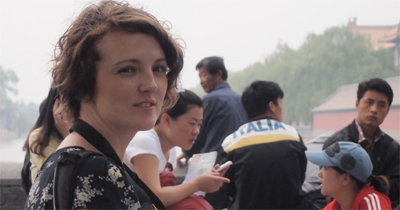NANJING, Aug. 1 (Xinhua) -- On summer days, Yang Rui enjoys strolling near an ancient wall encircling east China's Nanjing.
Her leisure moment is seldom disturbed by the bricks' pock-marking with bullet holes left 78 years ago when invading Japanese troops captured the then Chinese capital.
"I seldom noticed those marks of war before," admits Yang, a 25-year-old Nanjing native who is now working in advertising in Tokyo.
Even as China marks the 70th anniversary of the end of World War II and its war against Japanese aggression, it's possible to go about daily life in this bustling city without being haunted by the Japanese's brutality that followed the invasion. But memories of the Nanjing Massacre never vanish.
"Every December 13, sirens sound across the city to remind us of the massacre. It's the darkest moment in modern China, it happened right here in Nanjing, and I will never forget," Yang tells Xinhua.
Japanese troops occupied Nanjing on Dec 13, 1937. Over the next six weeks, they slaughtered 300,000 people in the city.
Local schools are one of the places where Nanjing residents' mixed feelings about Japan are most keenly felt.
Speaking Japanese may help a young person secure a good job, as Yang found, but Japanese language courses are understandably not the first choice for most Nanjing students.
In Nanjing Foreign Language School, one of Jiangsu province's top high schools, students study languages for six years alongside their regular courses. According to the school's website, 320 students are studying English, French, German and Japanese this year.
The school declined to give the number of students enrolled each year for the Japanese class, but Yang, who studied Japanese at the school from 2002 to 2008, said the class usually had a mere dozen or so students in those years.
Even this small number could "fluctuate with ups and downs in Sino-Japanese relations," she says.
According to a teacher from the class, "people in Nanjing are particularly sensitive to Japan-related topics. Some parents do not want their children to learn Japanese language because of the history issues."
Despite the opposition, it is from occasions such as the Japanese class that the young generation of Nanjing can learn about Japan and its people.
"Our Japanese teacher was an old gentleman. He was very patient to teach us," Yang recalls. "We later learnt that he came to China as a volunteer just because he wanted to reflect on history."
"Even after leaving the school, we kept in contact by writing letters. He once told me that every year when the siren in Nanjing wailed to commemorate the victims of the Nanjing Massacre, he would hide in his room with a heavy heart."
"That is an impressive detail for me," Yang says. "Friendly exchanges between us and Japanese people should continue."
Her feeling are shared by many of Nanjing's young people, who grew up in an environment in which heart-wrenching recollections of the past mixed with the reality of more tangible ties between China and Japan.
Visits to the Memorial Hall of Victims in the Nanjing Massacre are a regular fixture on the curriculum of Nanjing students.
"The visit was a shocking experience and I was deeply sad afterwards... but it did not stop me liking Japanese culture," says Zhang Siwei, a 27-year-old Nanjinger.
Decades of China-Japan exchanges in business and culture since 1972, when the two countries normalized their ties, have influenced daily life in many ways.
From home appliances to pop culture and literature, Japanese elements can be found throughout China. Nanjing is no exception.
Toyota and Honda cars zip up and down its main high street. A few blocks away, customers shop in a Uniqlo store.
With China marking the war anniversary, publications about the Nanjing Massacre and WWII take up most of the shelves in a bookstore in downtown Nanjing. In one corner, however, a young man reads a book by popular Japanese novelist Haruki Murakami.
"Japanese TV dramas and animated films were popular when I was in high school. I remember talking about them and playing Nintendo with my classmates," says Zhang.
Nevertheless, Siwei is not Zhang's real name. Any opinion on the Japanese is likely to court controversy in the city, as indicated by the fact that some of the locals Xinhua spoke to for this article requested anonymity.
Guo Biqiang, a 59-year-old Nanjing native, and a researcher at the Second Historical Archives of China, believes cultural exchanges among the young are a major trend of our times. But he also urged Japanese to be more sensitive to the feelings of Nanjing people.
"It is when talking about the Nanjing Massacre that we require right-wing Japanese politicians to face up to history," said Guo.
China and many other Asian nations have repeatedly blamed right-wing Japanese of whitewashing the country's militarist past. The latest controversy arose in May when Japanese Prime Minister Shinzo Abe refused to recognize the ruling of the 1945 Potsdam Proclamation which demanded Japan's unconditional surrender to the Allies at the end of WWII.
People of Nanjing will never forget what happened in the winter of 1937, Guo said. "We don't have to always talk about history, but it is always there, just like the bullet holes on our ancient wall."
For a scholar focusing on Australia's public diplomacy, working as a recreational manager in China may never be part of his career path. But Bradley McConachie does have lots to say now about his special experience at a resort in the picturesque tropical coastal city of Sanya in South China's Hainan province.

One of the potentially most traumatic things a girl has to go through is finding a new hairdresser.